Reviews: Bob Dylan, Lakou Mizik, Katie Noonan, Weeping Willows, ATM15
Bob Dylan is still a master songwriter, but his interpreters have long since overtaken him in the vocal department.
Fallen Angels, by Bob Dylan (Colombia/Sony). Score: 2.5 out of 5
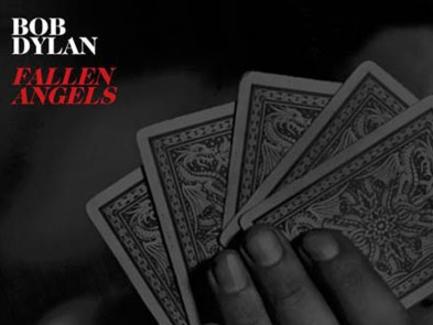
There are almost as many fine interpreters of the Bob Dylan songbook as there are of the Great American Songbook, and one of the very best, English singer-songwriter Barb Jungr, embarks on an Australian tour early next month.
It would only be fair to advise Dylan aficionados to check her out rather than bother with this particular release from the object of those interpreters’ affections. It’s not an absolute disaster by any means. The backing on almost every track is exquisite. But then the vocals chip in, and you are compelled to wonder: what did Harold Arlen and Johnny Mercer do to deserve this? Actually, the Arlen-Mercer gem That Old Black Magic is a redeeming feature of this album, a rockabilly shuffle that relieves the ennui that characterises the other 11 tracks. Sure, there are plenty of other great songs, most of them recorded at one time or another by Frank Sinatra.
Of course, Sinatra, too, misfired on occasion, not least when he ventured into disco in the late 1970s with an album that included a distressingly revised version of All or Nothing at All. Thankfully, Dylan plays it straight, as he does with almost every other song, from Young at Heart, which — somewhat poignantly, it must be admitted — kicks off the album, through Polka Dots and Moonbeams, All the Way, Hoagy Carmichael and Mercer’s Skylark, the relative curiosity On a Little Street in Singapore, Melancholy Mood and the album closer, Come Rain or Come Shine.
Several of his choices have, no doubt, stood the test of time via a plethora of interpretations, but invariably through the mediation of interpreters whose vocal cords were still more or less intact. Dylan’s voice retreated to a nasal wheeze a quarter of a century ago, although I must concede that whereas I was initially appalled by Good As I Been to You and World Gone Wrong, I found both albums rather endearing upon returning to them some 20 years hence.
It’s not inconceivable that last year’s Shadows in the Night and Fallen Angels will eventually be open to reinterpretation. The latter has been greeted with fawning reviews in publications such as Mojo and Uncut, but I am more inclined to revert to Greil Marcus’s gut reaction to Self Portrait in 1970: “What is this shit?”
It’s only fair to note, though, that Dylan’s 75th birthday this week more or less coincided with the 50th anniversary of Blonde on Blonde, and his recorded repertoire up to that point alone liberated him from having to worry about his legacy as an artist. No one before or since has scaled those heights as a singer-songwriter. By the time of his motorcycle accident a half-century ago, Dylan had already earned the right to self-indulgence, and this superfluous album fits comfortably into a trajectory where the embarrassing dross is overwhelmed by the brilliance of the preceding blaze. -Mahir Ali
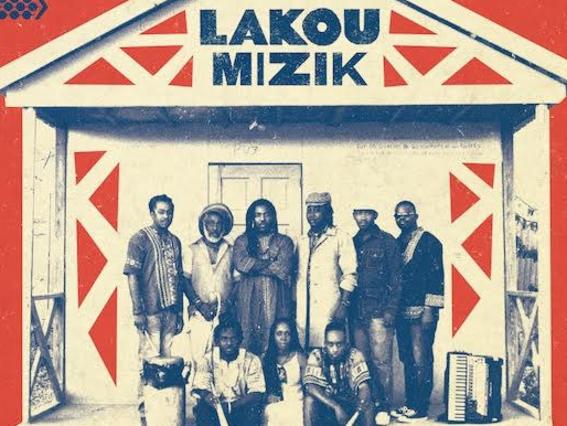
WORLD
Wa Di Yo
Lakou Mizik
Cumbancha/Planet
4 stars
From the earthquake that devastated Haiti in the second week of 2010 emerged a nine-piece multi-generational roots-revival band that’s been blowing away locals in Port-au-Prince and is now set to engage with the world at large. Reflecting the African, French and American influences that coagulate in Haitian music, Lakou Mizik intersperses waves of upbeat carnivalesque groove with the laid-back vibe that also characterises Caribbean island music. Wa Di Yo kicks off with a traditional romp in which mesmerising drumming and wheezy zydeco-esque accordion underpin trumpeting cornets and incantations. The album concludes 10 tracks later with the title cut, an ultra-soulful band original propelled by clattering cowbells that reverberates with attitude and defiance. As the (translated) catchline declares: “You tell them — we’re still here.” In between, there are contrasts in style and feel, from lighter zouk-like traditional numbers to breezy call-and-response songs driven by guitar and accordion riffing and voodoo-informed percussion. The band’s vocal strength and harmonic excellence is emphasised in a couple of short a cappella pieces. The sole female member gets to exercise her vocal cords via well-arranged indigenous works, one connected by a toastin’ bridge. With band members’ ages ranging from early 20s to late 60s, Lakou Mizik could be classified as a Haitian cousin of its famous Cuban neighbour, the Buena Vista Social Club, or, from the perspective of genesis, the Caribbean counterpart of Sierra Leone’s Refugee All Stars.
Tony Hillier
*
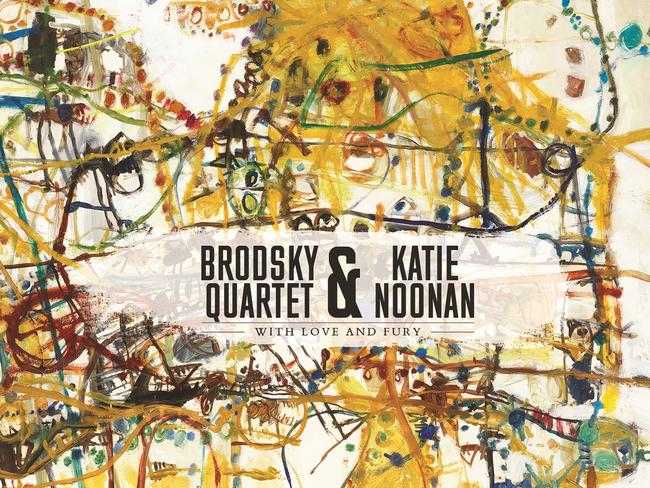
VOCAL
With Love and Fury
Brodsky Quartet & Katie Noonan
Kin Music
4.5 stars
Katie Noonan first made the acquaintance of the Brodsky Quartet through its celebrated 1993 collaboration with Elvis Costello, The Juliet Letters. Almost 25 years later this renowned British ensemble is Noonan’s backing band. Noonan has chosen 10 of her favourite Australian composers to set texts by the Australian poet-environmentalist Judith Wright. There is ample variety here, but the gossamer tones of Noonan’s voice provide continuity that sustains the hour of music. Trained in opera and unafraid of venturing into unfamiliar vocal territory, Noonan seduces the listener with close-miked singing somewhere between Bjork and Cathy Berberian. In settings by Iain Grandage and David Hirschfelder, she soaks operatically. In music by John Rodgers and Richard Tognetti she leaps over the pitfalls of contemporary vocal techniques. In her own song and another by Paul Grabowsky, she purrs like a late-night torch singer. Carl Vine, Andrew Ford and Elena Kats-Chernin skirt over the boundaries of the concert platform. This is music that is deeply satisfying, delivered with insight and sensitivity.
Recorded in London in February, the performances are uniformly excellent, but the liner notes, such as they are, are disappointing. While it’s wonderful to have all 10 Wright poems quoted in full, there is no salient commentary about Wright or her legacy. No details about the composers, nor durations. No doubt future pressings will address these basic omissions.
On this landmark album, Noonan is at the top of her game. Perhaps only momentarily: with each new venture, she leads herself and her listeners to higher levels of experience and sheer delight.
Vincent Plush
*
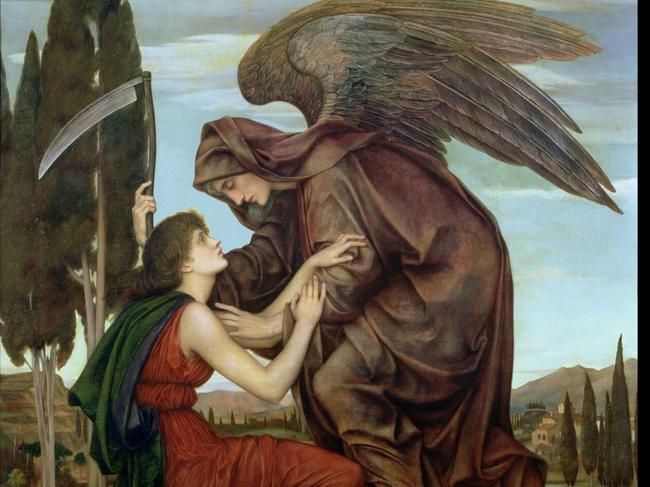
AMERICANA
Before Darkness Comes a-Callin’
The Weeping Willows
Independent
4 stars
With Before Darkness Comes a-Callin’ Melbourne duo the Weeping Willows offers a consistently chilling vision of a world gone to hell, where people are making poor choices and facing the prospect of having eternity to pay for them.
The oppressive weight and consequences of living and loving are laid bare with a surgeon’s precision in 10 songs filled with power and beauty. They sound like they could have been written anytime in the past century.
Recorded in Los Angeles by producer Ryan Freeland, with overdubs added in Nashville, Floresville, Texas, and Ontario, there is well-placed confidence in the material, with never more on offer than is required musically or lyrically. Laura Coates’s voice has an attention-grabbing power while Andy Wrigglesworth’s contributions are more intimate, as every song builds on the blend of their rock steady singing and his guitar playing.
David Piltch’s upright bass adds a heartbeat and backbone while sympathetic touches from guests on steel (Tommy Detamore), banjo (Kevin Breit), fiddle and mandolin (Luke Moller) add a polish that never detracts from the dirty business at the heart of the duo’s material.
The scant detail in murder ballads Forever in My Dreams and Garden of Tears adds a touch of mystery. River of Gold is a love song of sorts but one where the singer says in chilling fashion, “I’ll take the fall and sell my soul to you”. Travelling Man (co-written by Lachlan Bryan) offers a conversation between a couple where one is driven to follow his dream no matter the consequences. The addition of Detamore’s haunting steel makes it the most compelling track.
Polly Coufos
*
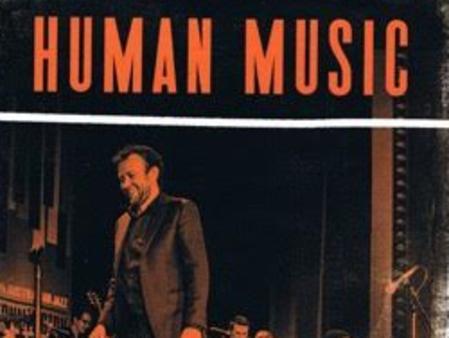
JAZZ
Human Music
ATM15
Independent
4 stars
ATM15 is a 15-piece Melbourne big band that includes its director and composer Andrew Murray. The collection of eight Murray originals is masterfully arranged and well recorded — no small achievement when 14 instruments are involved — at Allan Eaton Studio in St Kilda.
Murray’s arrangements make efficient use of his soloists and the large ensemble, sometimes in an overlaying format. Listen to This pushes the tempo along, courtesy of strong work from drummer Hugh Harvey, especially in a lengthy opening solo and in exchanges with the band; racing solos are also provided by Ron Romero’s tenor sax and Darrin Archer on keys.
At the slow end of the tempo scale, Karma features harmonic complexities in the full band voicings, while Derby Jump does what the title suggests, showcasing a sequence of swinging tenor exchanges between Romero and Stephen Blyth. The full band jumps with Basie-like intensity. Dig spreads an invigorating slower soundscape with swing-era echoes using drum assistance and includes a shout-it-out trombone solo from Alistair Parsons. Further inventive arranging opens Early Days to introduce Tim Wilson’s spirited alto sax solo and fine, overriding trumpet work from Callum G’Froerer.
Murray is to be complimented on the huge task of forming this impressive big band, containing several outstanding soloists, and for writing and skilfully arranging these impressive compositions while avoiding musical cliche.
John McBeath


